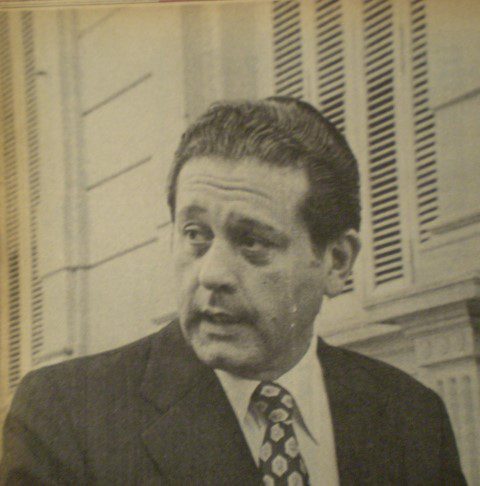Judith Wagner
München, Germany
 |
| Dr. René G. Favaloro |
“If you don’t know exactly where you’re heading by age 30, you won’t have a career in university medicine.” This phrase, which I heard on my first job interview, remained stuck somewhat menacingly in my head. Is it truly the condition sine qua non of high-end medicine to choose your track this early and remain on it for the rest of your (medical) life? Is it the price to be paid for being part of an increasingly specialized science?
But – lo and behold! – some of our contemporaries did not content themselves with the one world of lab coats, journal clubs, and glittering instruments. Their lives wound around multiple paths. One of these multifaceted colleagues of ours was the Argentine René Favaloro, known as the pioneer of coronary bypass surgery. Before joining the realm of the acclaimed thoracic surgeons, Favaloro spent 12 years leading the life of a country physician. He vividly illustrates these experiences in his book “Memories of a country physician.”1
René Gerónimo Favaloro was born as the son of a carpenter and a dressmaker in La Plata, Argentina, in 1923. From an early age, he voiced the desire to become a physician, inspired by his uncle, a general practitioner. An outstanding student at the Medical Department of the University of La Plata, he seemed predestined to follow the footsteps of his teachers and dedicate himself to a university career. In this situation, he saw himself confronted with a request from his uncle: the general practitioner of Jacinto Aráuz, a village of 3,500 inhabitants in the midst of the pampas, needed to spend two or three months in Buenos Aires in order to receive medical treatment and was looking for a fellow physician to cover this period. Favaloro agreed to act as a temporary replacement, not knowing that this decision would determine more than a decade of his life.
Favaloro took up his new challenge in 1950. When his predecessor died a few months later, Favaloro had already – in spite of his initial apprehensions – developed a deep attachment to the region and its people and decided to stay. Life in Jacinto Aráuz was marked by the hardships faced by a rural community in the midst of the dry pampas. The population lived scattered on small subsistence farms with droughts threatening each year’s harvest (and thus the local GP’s salary!). Medical resources were sparse: laboratory tests were restricted to the most basic problems, Favaloro spent hours making his way to remote farms in case of emergency, most surgical procedures were impossible to perform, and grave cases had to be transferred to Bahia Blanca, a trip lasting several hours on often hardly traversable gravel roads.
Due to these inconveniences and to painful experiences with patients whose treatment was insufficient due to lack of resources, a plan ripened in Favaloro’s mind: he was going to construct a center of medical assistance to adequately provide for the most common health issues and emergencies occurring within the community. He turned the house in which he was living into the new clinic, furnishing three rooms with hospital beds, installing a simple x-ray apparatus, and using an old examination bed as an operating table. By securing the help of the local pharmacist, he managed to expand the panel of available laboratory investigations. He collaborated with the town’s midwives and “curanderas” (female healers) to help with the clinic, contribute to the instruction and education of the local population concerning matters of health and disease, and train townswomen as nurses for the incipient hospital. For sporadic emergencies a “living blood bank” was created: the blood of young volunteers was typed and the donors were summoned to the hospital in case of need. The high-flyer turned country physician had become an integral part of the community of Jacinto Aráuz, managing to significantly improve its medical infrastructure, reduce infant mortality, and contribute to disease prevention by health education.
During all this time however, Favaloro’s interest in new medical developments – particularly in the field of thoracic surgery – had never ceased, and at the age of 38, he decided to give up rural medicine for a career at the Cleveland Clinic, United States, where he would work for more than a decade, performing the world’s first coronary bypass surgery in 1967.
In 1971, he returned to Buenos Aires, where he created the Fundación Favaloro, a center integrating high-level medical care, research, and instruction. The Foundation – together with the Favaloro University founded in 1998 – is nowadays one of the most important medical centers in Latin America.2
In 2000, Favaloro – disillusioned by great financial burdens, bureaucratic difficulties, and corruption faced by the Foundation during times of economic turmoil – committed suicide in his home in Buenos Aires. In his farewell letter he stated that his ashes “should be strewn in the mountains near Jacinto Aráuz,” the very place of his first medical life.3
References
- Favaloro, R. Recuerdos de un médico rural (Kindle Edition). Debols!llo (2011).
- Museo Virtual René Gerónimo Favaloro. https://www.fundacionfavaloro.org/museo_biografia.html Accessed November 11, 2013.
- La última carta de Favaloro antes de morir. https://www.infobae.com/2013/10/09/1514794-la-ultima-carta-favaloro-antes-morir Accessed November 11, 2013.
JUDITH WAGNER, MD, graduated from Freiburg University in 2004 after studying in Freiburg (GER), London (GB), Mendoza (ARG) and Boston (USA). Since 2005 she has been working in the Department of Neurology, Klinikum Grosshadern, University of Munich. Supported by a DFG (German Research Community) grant, she spent one year (2012) at the Favaloro Foundation in Buenos Aires, Argentina, investigating the spatial orientation in patients with Pisa syndrome.

Leave a Reply